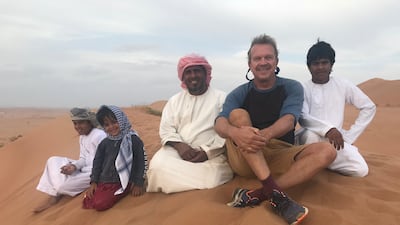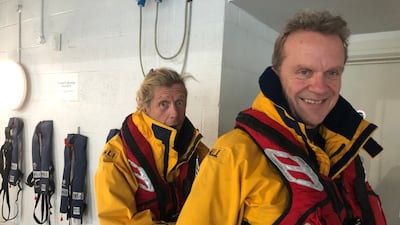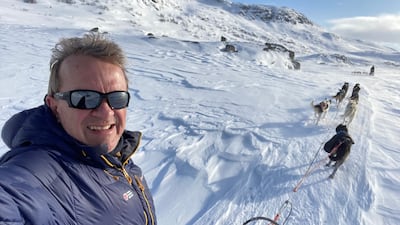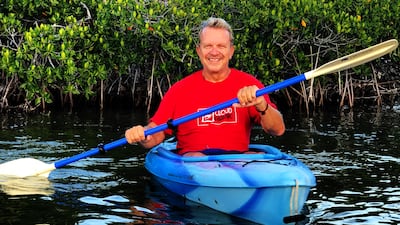The global network of doctors who work in dangerous places is set to be expanded through a new training programme for health professionals in Dubai.
The World Extreme Medicine programme teaches physicians the skills they need to deliver emergency care in harsh environments such as mountains, jungles, deserts and even outer space.
More than 20,000 medical professionals have so far attained the qualifications necessary to allow them to join expeditions in some of the most hostile environments on Earth.
With Dubai’s prime location as a centre point for rapid response to humanitarian crises around the world, it is hoped more nurses, doctors and paramedics can be trained to expand the network of those with specialised skills.
explorer
World Extreme Medicine was founded in the UK in 2002 by Mark Hannaford, an adventurer and entrepreneur, who led expeditions across five continents, during which he came to understand the need for specialised medical expertise in dangerous environments.
“On these expeditions, I realised we were quite remote but the risks were significant,” he said.
“We employed doctors to join us on regular expeditions using standardised kit and they said plenty of their colleagues had an interest in learning new skills.
“Eventually we did our first UK course and 70 doctors turned up.
“Now we run around 30-40 courses around the world for doctors to work in mountain environments or in the jungle or desert.
“There is also an academic master's programme that has been running for seven years.”
Remote medicine
World Extreme Medicine is now regarded as a medical sub-discipline with a global community of 250,000 practitioners, experts and leaders working together to deliver urgent care outside normal medical environments – from outer space and the deepest oceans to remote deserts and the highest peaks.

Courses include delivering care in the mountains of Slovenia and the French Alps, conservation medicine in Namibia and the requirements of humanitarian aid in Devon, England.
He hopes a similar training programme can be established in the UAE.
“Expeditions are becoming more common. The global community is much bigger and people want a life-work balance to get fit and be outdoors,” said Mr Hannaford.
“It is also more accessible now.
“Anecdotally, we know those who go through this return to hospitals stronger medics because of their experience.
“Skills like problem-solving, risk assessment and working as a team are all well developed and have more relevance in an extreme setting, even in space.
“Nasa spends an awful lot of money on extreme medicine, preparing crews for life in space.
“There is a big health issue with astronauts being in space for so long and that is changing.
“The medical kit they have access to is often less than the average London paramedic.”
Hollywood role
Specialist care provided by World Extreme Medicine has even been used by Hollywood producers, not only to offer medical support on location during filming but also during the pandemic.
The Hollywood connection began when filmmakers were told they could only continue to make movies as long as strict health procedures were followed.
“Closing movies down because of an outbreak was very expensive and many livelihoods relied on these films,” said Mr Hannaford, who has been offered a golden visa in the UAE to help set up his operation.
“The task was to keep crew safe by keeping infection rates low to keep the production moving, with separate zones for cast and production crew to reduce risk of an outbreak.”
The company was asked to provide cover for Mission Impossible, the Jack Ryan TV series, Transformers and other, smaller films and shows such as the US Survivor programme.
Challenging situation

Adventurers such as mountaineer Tima Deryan know only too well the value of medical expertise in extreme environments.
The Dubai-based Lebanese explorer aimed to become the first Arab woman to complete the Adventurers Grand Slam, the challenge of climbing the Seven Summits, the highest peak on each continent, and then skiing to the North and South poles.
After being struck down with Covid-19 in 2020, 10 days after climbing Mount Baruntse in Nepal, her health rapidly deteriorated.
“I was not aware that it was Covid so I stayed on a mountain hut at 5,000 metres waiting for my condition to improve so I could continue,” said Ms Deryan.
“Had I not had the right training and teamed up with a capable insurance provider, I would not have made it.”
After five days of waiting, her oxygen saturation dropped to 40 per cent and her body temperature climbed to 40°C.
Ms Deryan was eventually evacuated off the mountain following emergency treatment from specialist caregivers but was thankful for the first aid knowledge she had.
“These kinds of situations can happen unexpectedly, so it's very important to have the knowledge and training on how to act in such situations in remote areas,” she said.
“It’s good to see World Extreme Medicine is setting up in Dubai as more people are interested in going outdoors and challenging themselves.
“Such courses are very important to improve the outcome in some of the most challenging situations around the world.”





